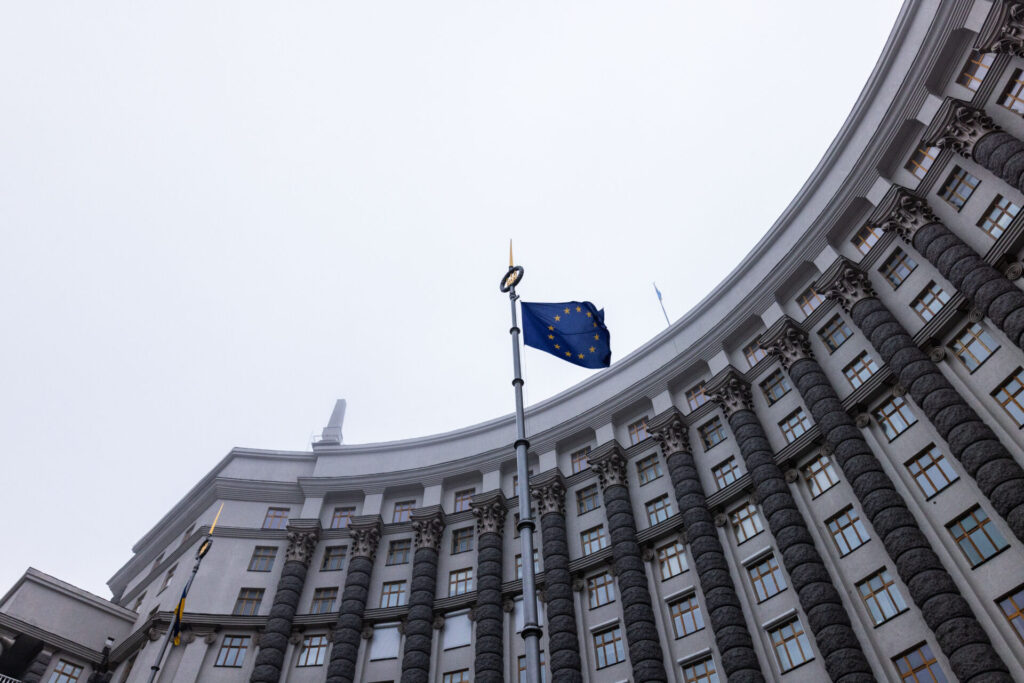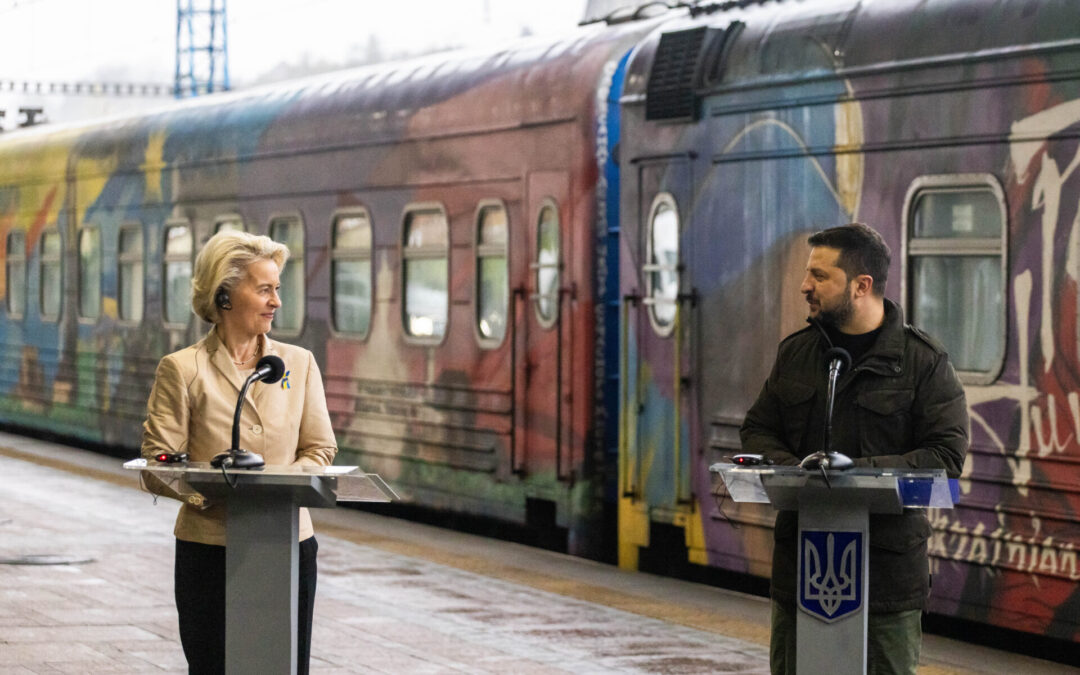 Have the article read by OpenAI (Beta). Please note that AI translations may take some time to process.
Have the article read by OpenAI (Beta). Please note that AI translations may take some time to process.“I’m here to discuss Ukraine’s accession path to the EU,” von der Leyen wrote on X, formerly Twitter, posting a picture of Zelensky greeting her on arrival at the Kyiv train station. She added that they would also discuss the EU’s “financial support to rebuild Ukraine as a modern, prosperous democracy”. Talks will also include “how we will continue to make Russia pay for its war of aggression”, von der Leyen added.
The visit comes amid concern that support for Ukraine might wane as turmoil in the Middle East currently holds a lot of the global attention. Von der Leyen said that her trip had been planned for a “long time” and that it was a traditional visit to make before presenting a report on the enlargement of the EU on November 8.
Ukraine’s EU accession: “Excellent progress”, but further improvement needed
Today, the Commission must submit a report on the state of progress made by Ukraine, Moldova and Georgia and decide whether or not to open accession negotiations before the EU-27 meet for an EU summit on December 14 and 15. Enlargement will be at the core of the Brussels meeting.
Ukraine has been an official candidate country since June 2022. Unanimous agreement by the 27 EU member states is needed to start membership negotiations. To get a positive vote, the country must have fulfilled seven requirements which include reform of the selection procedure for Ukrainian constitutional judges and a stronger fight against corruption – particularly at high levels.
“I must say you have made excellent progress. This is impressive to see,” von der Leyen said after a meeting with Zelensky. “You are fighting an existential war, and, at the same time, you are deeply reforming your country. You have reached many milestones: reforming your justice system, curbing the oligarchs’ grip, tackling money laundering, and much more.”
Von der Leyen affirmed that Ukraine has carried out “more than 90%” of the reforms that were requested of it, but recalled that it still must make changes to the minority law to guarantee rights such as for ethnic minorities to receive education in their own language.
The Commission president also mentioned that to continue strengthening the transparency of politicians’ asset declarations and the fight against corruption and to approve a law on lobbying activities were among the pending issues.
According to a statement from the Ukrainian presidential office, bills are already registered in the Verkhovna Rada – the Ukrainian parliament – to improve the functioning of the Anti-Corruption Prosecutor’s Office, reduce the influence of oligarchs and improve the transparency of state institutions.
In his press conference with von der Leyen, Zelensky expressed confidence in Ukraine’s chances of arriving fully prepared for the final exam and highlighted the motivating effect that a ‘yes’ from all member states would have on Ukrainian society and soldiers who fight on the frontline “for EU values”.

EU-Russia: Round 12 of Sanctions, aid package for Ukraine
Regardless of possible political milestones, both Zelensky and von der Leyen called for continued support to help Ukraine respond to Russian aggression. The EU is currently studying a new series of sanctions against Russia, and a long-term aid package to support Ukraine.
The EU has already contributed 83 billion Euro in financial assistance. The Commission president anticipated that a further 3 billion Euro will be forthcoming before the end of the year. She also said that even more funds will be needed, referring to a further 50 billion Euro from an additional plan until 2027 that is backed by almost all 27 EU countries, with only Hungary and Slovakia baulking.
Von der Leyen announced on Saturday that the European Union will adopt new economic sanctions on Russia, including measures against companies from non-EU countries that circumvent the sanctions. For too long, many in Europe had thought it was possible to trade with Russia and integrate the country into the European security order, the EU chief said during a speech in the Ukrainian parliament.
This new round of punitive measures – which would be the twelfth approved by the EU since the beginning of the war – could include sanctions against Russian propagandists and against figures involved in the mass deportation of Ukrainian minors.
Another novelty, according to von der Leyen, could be the introduction of “new bans on imports and exports” to and from Russia and “actions to adjust the cap on the price of gas”, adopted almost a year ago to deny the Kremlin resources with which to finance the aggression against Ukraine.
Several high-ranking EU officials reported last week that there are plans to restrict trade in Russian diamonds. Also on the table is an import ban for so-called dual use goods, materials that can be used for both civilian and military purposes. This could include an import ban on aluminium and export restrictions on other goods. The Ukrainians have sometimes discovered microchips in Russian missiles that are normally installed in refrigerators.
Numerous punitive measures have long been in place against Russia due to its war against Ukraine. These include a far-reaching ban on imports of crude oil, coal, steel, gold and luxury goods, as well as sanctions against banks and financial institutions.
Zelensky has once again asked that the new package serves to prevent the sanctions that have been approved so far from being violated.
Ukraine-Russia: No stalemate, no pressure
The Ukrainian president denied on Saturday that Ukraine’s counter-offensive against Russian forces had hit a stalemate, as hours later Kyiv said it had struck a shipyard in the Moscow-annexed Crimean Peninsula.
The sprawling frontline between the two warring sides has barely moved in almost a year, with one senior Ukrainian official warning this week that the conflict was deadlocked.
“Time has passed, people are tired… But this is not a stalemate,” Zelensky told a press conference in Kyiv with EU Commission chief Ursula von der Leyen.
Time has passed, people are tired… But this is not a stalemate.
Ukrainian President Zelensky
The Ukrainian leader also denied that Western countries were putting pressure on Kyiv to enter negotiations with Russia, amid reports US and EU officials had discussed what such talks might entail.
“No one among our partners is pressuring us to sit down with Russia, talk to it, and give it something,” he said.
This article is published weekly. The content is based on news by agencies participating in the enr.
